- Home
- Steve Vernon
Cat Tales Issue #1
Cat Tales Issue #1 Read online
Cat Tales Issue #1
Steve Vernon
Jamie Ferguson
Thea Hutcheson
Deb Logan
Mollie Hunt
Michael R.E. Adams
Dara Girard
Linda Jordan
De Kenyon
Contents
About this Bundle
Fonts in this Ebook
Steve Vernon
Cat Call
Cat Call
About the Author
Also By Steve Vernon
Jamie Ferguson
The Cat’s Meow
Title Page
The Cat’s Meow
About the Author
Thea Hutcheson
A Hearth Witch at Chisolm Keep
Title Page
A Hearth Witch at Chisolm Keep
Reviews
About the Author
Other Works by Thea Hutcheson
About Lilac Moon Books
Deb Logan
On Guard
On Guard
Acknowledgments
About the Author
Also by Deb Logan
Mollie Hunt
The Dream Spinner
Other Books by Mollie Hunt
The Dream Spinner
About the Author
Michael R.E. Adams
The Sprite and The Familiar
Title Page
The Sprite and the Familiar
Find Reading Order & Sign Up for Discounts
About the Author
Dara Girard
Pawprints in the Snow
Pawprints in the Snow
Pawprints in the Snow
About the Author
Also Available
Copyright Information
Linda Jordan
P.U.R.R.— Protectors United for Residential Requisition
P.U.R.R.—Protectors United for Residential Requisition
About the Author
De Kenyon
The Society of Secret Cats
The Society of Secret Cats
Excerpt from The King of Cats (coming soon!)
About the Author
Other Works by the Author
About BundleRabbit
Don’t Miss These Other Amazing Bundles!
About this Bundle
No matter where you are, no matter what you are doing - cats are always watching you. Even when you think that cat is totally ignoring you, that cat is watching.
Do you own a cat? Take a quick look, and see if that cat doesn't flick one ear, or twitch their tail, or even briefly cock one vertical eye into a kind of a gun-slit winky-peek radar-honing right in your general direction - while all the while letting on like that cat doesn't even notice you.
So, seeing that your cat is doing all of that watching, maybe you had better grab yourself a look at these nine magical cat tales. Read them to yourself or better yet read them aloud to your cat and see if you can't irritate one of those low and rumbling growls of indignation that only cats can seem to make happen.
Just watch and see.
In ancient times cats were worshiped as gods; they have not forgotten this.
Terry Pratchett
The problem with cats is that they get the same exact look whether they see a moth or an ax-murderer.
Paula Poundstone
When my cats aren’t happy, I’m not happy. Not because I care about their mood but because I know they’re just sitting there thinking up ways to get even.
Percy Bysshe Shelley
Kittens are born with their eyes shut. They open them in about six days, take a look around, then close them again for the better part of their lives.
Stephen Baker
Fonts in this Ebook
This ebook primarily uses the Alegreya font, designed by Juan Pablo del Peral.
Alegreya is a typeface originally intended for literature. Among its crowning characteristics, it conveys a dynamic and varied rhythm which facilitates the reading of long texts. Also, it provides freshness to the page while referring to the calligraphic letter, not as a literal interpretation, but rather in a contemporary typographic language.
The italic has just as much care and attention to detail in the design as the roman. The bold weights are strong, and the Black weights are really experimental for the genre.
Not only does Alegreya provide great performance, but also achieves a strong and harmonious text by means of elements designed in an atmosphere of diversity.
Drop caps are provided using the Great Vibes font by TypeSETit. Great Vibes provides an elegant flair which adds to the text’s aesthetics.
* * *
For the best reading experience, please set your ebook to use the Publisher or Original font.
Cat Call
Nobody really knew how long the old Funnel mansion had stood empty, waiting up there high on Carpenter’s Hill like a child’s forgotten lunch box, any more than anybody knew just how long that old gray cat had squatted in behind the screen of the front porch window.
All we knew was somebody must be feeding it, because every now and then we would look in from the hedge on the far side of the yard and see the cat nibbling daintily on what looked to be raw hamburger.
“Guts,” proclaimed Jeremy Hooter, making a thick juicy swizzling noise with his lips and tongue pressed against his stainless steel braces. “It’s guts, is what it is.”
“Great big gobs of owl guts,” amplified Charlie Roundbert.
Charlie Roundbert was only half of Jeremy’s size and age, but he might as well have been Jeremy’s shadow. The two boys stuck together just that closely and yet as far as I knew the two of them never had anything nice to say to each other.
“Owl guts,” Charlie repeated.
We all took up the chant except Jeremy, who didn’t think it was funny at all.
“Owl guts, owl guts, owl guts.”
Owl was what we always called Jeremy, because of his last name. It didn’t help that Jeremy wore a pair of glasses that made coke bottle bottoms look like microscope slides.
The glasses always reminded me of Dr. Cyclops. You know the guy from the movies? It always looked to me like Jeremy was staring at us through a microscope, like we were some kind of alien bacteria from Planet X.
I had a microscope given to me on my tenth birthday, not one of those little bitty plastic toys they sell with the chemistry sets you order from the Christmas catalogue, but a big old-fashioned kind that my Dad found in a basement he’d been paid to empty. The basement had belonged to old Doc Hawcomber, and when the doctor saw the microscope he told my Dad to go ahead and take it, he had a new one he used anyways. My Dad always said that the microscope was probably contaminated with all kinds of plagues and diseases and he was likely being ten kinds of an idiot giving it to a kid like me.
I told my Dad not to worry. Germs didn’t stick to dead things like microscopes and houses. Germs stuck to people. Germs needed meat to feed on, and he probably shouldn’t worry so much.
I knew he wasn’t being all that serious anyways. He was my Dad, and the only person I had in this world, next to my dog Riley. The only difference was, Dad was real. Riley had been real, but he was imaginary now, since the timber truck ran over him.
I knew my Dad liked to worry about me, like it was his hobby or something, and I loved him for this worry, imaginary or not.
I got Riley from my Mom when I was two. Riley was a big black Labrador retriever, with feet as big as snow shoes in the
pictures we have of him.
We don’t have too many pictures of Mom, because it was my Mom’s camera, and Dad never felt that comfortable using it. He’s got his own camera now, and he uses it whenever he can.
Riley was my dog, and he would play fetch with me with a worn out baseball from the time the sun got up in the morning until the time it crawled back into bed. He was killed when I was eight years old, because of a ball I had misthrown. The ball bounced out into the roadway and Riley followed the lure of the ball like a trout following a wriggling worm. The truck rolled over him before I even had a chance to scream.
I got Riley when I was two, and my Mom died when I was three, and Riley died when I was eight, and I can still remember how I used to stare into his big black jujube eyes and see my mother smiling out from inside those eyes. I loved Riley better than I loved spaghetti, and I loved spaghetti a lot.
Dad said I got my spaghetti eating habit from my Mom. Back before the accident, back when Mom was alive she loved eating spaghetti more than anything. I can still remember seeing her with two long strands of spaghetti hanging from out of her mouth like a Fu Manchu sort of moustache, until she sucked them right back up, giggling all the way, with a big loud shlooooping sound.
It was the only memory I had kept of her. My Mom died when I was awfully young. A car wreck, Dad told me. It was a rainy October night, and the car wheels couldn’t hold to the road, and there was a sudden blast of lightning like somebody jumped out and said boo, and then Dad lost control of the wheel and they slid up against that big old beech tree down at the foot of Carpenter’s Hill. Dad had remembered to buckle up so he only twisted his back and broke his face against the dash board, but Mom forgot to buckle up so she went spilling right through the window glass and into the tree and Dad told me once one late night that he still saw the color of her blood in the leaves of that tree every autumn.
My Dad walks with a limp because of that crash, and his left eye has a strange tilt to it from where his face was broken. His face sort of looks as if he is always getting ready to cry and every October he carries a bouquet of quiet red roses up the side of Carpenter’s Hill to the town cemetery where my Mom is sleeping.
Jeremy, who is older than I am, told me once that he had watched from the bushes as the police ambulance medics scraped my Mom off of the trunk of the tree like she was so much hamburger meat. I told him he was a liar. I said that there was no way that would happen – that you just couldn’t make a person into hamburger meat.
We got into a fight over that, and he probably would have beaten me up, but I think he felt bad for what he had said to me.
Jeremy had said to me that some of the pieces of my Mom had been so small that the police had needed a microscope to find them.
* * *
I liked my microscope a lot. In the summer I liked to mix swamp water and hay in a big mason jar and let it sit and steep out back behind the old garage where the sun always shines, until my Dad would say something to me about “that unholy stink”, and I would take the water and make as many slides as I could and would dump the rest of it out back in the ditch. The ditch always smelled like swamp water, although I blamed the smell on Jeremy because he liked to pee in the ditch whenever he came over to visit.
The slides were always different. I liked to see paramecium and amoeba and all kinds of other things that I didn’t know the names of. I asked my Dad once where they’d all come from and how they got into the water. He said some of them were probably in the swamp water to begin with, and some of them were in the hay. Only the ones in the hay were sleeping, like seeds waiting to be rained on and hatched. Dormant, he called it, like they were waiting behind some kind of door.
I also liked to look at the hydra plants that I found under the lily pads of the swamp behind the school. I would wade out in to the swamp in my big rubber boots that used to be Dad’s until they started to leak. One day I got caught in the mud and nearly sucked under and my friends had to run for my Dad. Dad waded out to get me, and then for a while I thought he was going to get stuck too, and then I had this crazy picture in my mind of the whole town being out here stuck in the muck, waiting for the frogs and the leeches and the mosquitoes to suck us all dry, only Mr. Thornton came along with a big old rope and pulled the two of us out of there before the leeches, frogs and mosquitoes had a decent chance to get at us.
After that my Dad told me to stay away from that swamp. He told me that three winters before I was born two ice skaters went down through the ice and didn’t come back up. My Dad believed that because of that the swamp had developed a taste for people and it was just waiting for its next meal to come along, like some kind of giant Venus flytrap.
Jeremy had a Venus flytrap plant that his mother had bought at a county fair. In the summer, when it was too hot to do much of anything else we used to watch it take flies, luring them in slowly and then snapping them up like good old Godzilla. I wanted a plant just like it for the longest time, but my Dad wouldn’t buy one because he said we didn’t need it. My Dad was the town’s champion fly swatter, and he took pride in the fact that he could snag a housefly with his bare hands.
“You’ve got to watch for that handwashing motion that flies make,” he told me one too many times. “When they make that handwashing motion you know that they are too busy thinking about washing their hands to think about jumping into flight, so you can grab them because they aren’t really looking for it.”
“Right Dad,” I said. “If Chizmar’s Groceteria ever closes down we’ll be able to live off of the flies you catch for us.”
I liked going down to Chizmar’s Groceteria because it always smelled of the fresh pies that Mrs. Chizmar baked every day. Sometimes apple, sometimes peach, but best of all was her blackberry pie. Dad always said that Mrs. Chizmar’s blackberry pie made your belly want to climb out of your stomach and dance itself a jig for sheer joy.
I always told my Dad that your belly was your stomach, but that never stopped him from slapping his stomach every time he walked into Chizmar’s Groceteria and smelling those pies and telling Mrs. Chizmar that her apple pie made his belly want to climb out of his stomach and dance.
The neatest part of Chizmar’s Groceteria was the big meat shop out back where Mr. Chizmar worked. I didn’t really like the sound of the butchering that you heard every Monday morning, and the thick chewy whizz of the meat saw always made my belly want to climb out of my stomach and puke, but the sight of the dancing fly paper, covered in all those flies was really neat. It was like a kind of hanging jewelry, only it was alive and while Dad ordered the meat I liked to try and count the flies that were stuck on each strip.
Mr. Thornton used flypaper in the school washroom once, because the old plumbing didn’t work so well. The pipes didn’t suck the water down quickly enough. The water that didn’t go down the drains left a smell that the flies liked to follow, so Mr. Thornton hung flypaper up to catch them.
Mr. Thornton was the school caretaker. He made sure everything stayed clean. My Dad always called him a janitor, and when I asked Dad once what the difference was between a caretaker and a janitor he said - “Listen, you can call a turd full of freshly-dropped cow-pie a bouquet of daffodils, if you want to do, but that doesn’t do a thing about the stink.”
It was the same thing about the Funnel house. It wasn’t really a house, as far as we kids could tell. It was more like a piece of leftover Halloween decoration, like the old school float that Vice Principal Bindles parked in his garage all year waiting for the Fourth of July parade.
It really wasn’t a float. It was just an old dory that Vice Principal Bindles covered with tissue paper flowers and nailed to a nearly broken trailer. It still stank of fish, even though it hadn’t touched an ocean for more years than I was old, but it was our school float, and every Fourth of July Vice Principal Bindles and whoever was crazy enough to help him, made new flowers and repainted the parts that showed and wheeled it out and hooked it up behind Vice Principal Bindles’s old
Oldsmobile for the whole town to see.
It really wasn’t much of a parade when you think of it. It was just the school float, and a band of marching musicians that sounded worse than cats screaming at midnight, a wagon full of puppies that old lady Cray would drag along behind her with bows around each of the puppies that she was trying to find a home for before she had to take them out and drown them in the swamp, and a big old Model T that sounded noisier and smelled worse every year, and then there was the town mayor sitting in the back of a dirty red pickup truck on a throne made out of moose and deer antlers that was supposed to represent our frontier heritage. It wasn’t much of a parade at all, as far as I was concerned. It was more just a habit that folks had never learned to unstick themselves from.
* * *
So one hot summer day, me and my imaginary dog Riley and Jeremy Hooter and Charlie Roundbert and a half dozen other kids were up on Carpenter’s Hill in the hedge outside the Funnel House, taking dares on who’d get close enough to spit on the porch.

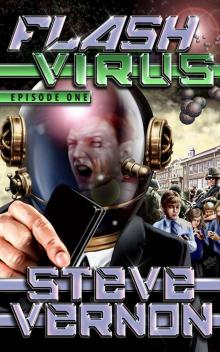 Flash Virus: Episode One
Flash Virus: Episode One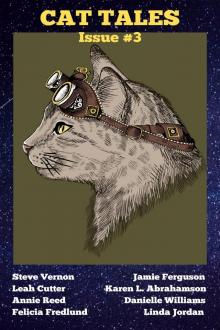 Cat Tales Issue #3
Cat Tales Issue #3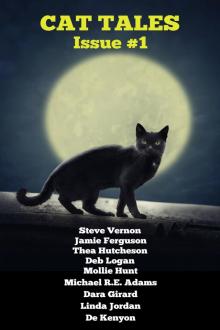 Cat Tales Issue #1
Cat Tales Issue #1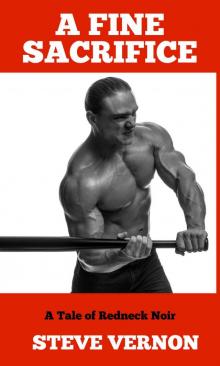 A Fine Sacrifice
A Fine Sacrifice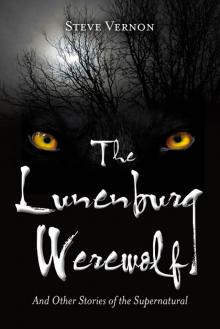 The Lunenburg Werewolf
The Lunenburg Werewolf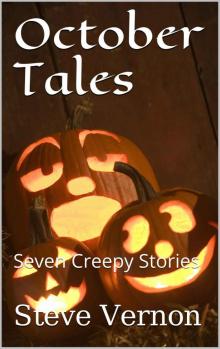 October Tales: Seven Creepy Stories (Stories to SERIOUSLY Creep You Out Book 1)
October Tales: Seven Creepy Stories (Stories to SERIOUSLY Creep You Out Book 1)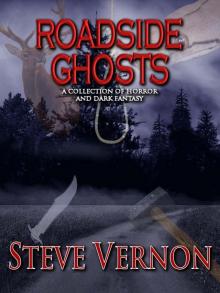 Roadside Ghosts: A Collection of Horror and Dark Fantasy (Stories to SERIOUSLY Creep You Out Book 3)
Roadside Ghosts: A Collection of Horror and Dark Fantasy (Stories to SERIOUSLY Creep You Out Book 3) Haunted Harbours
Haunted Harbours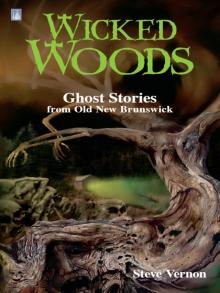 Wicked Woods
Wicked Woods Two Fisted Nasty: A Novella and Three Short Stories (Stories to SERIOUSLY Creep You Out Book 2)
Two Fisted Nasty: A Novella and Three Short Stories (Stories to SERIOUSLY Creep You Out Book 2)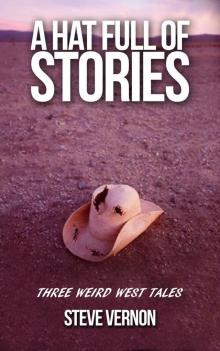 A Hat Full of Stories: Three Weird West Tales (Stories to SERIOUSLY Creep You Out Book 9)
A Hat Full of Stories: Three Weird West Tales (Stories to SERIOUSLY Creep You Out Book 9)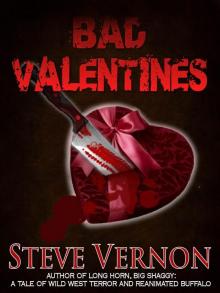 Bad Valentines: three twisted love stories (Stories To SERIOUSLY Creep You Out Book 7)
Bad Valentines: three twisted love stories (Stories To SERIOUSLY Creep You Out Book 7)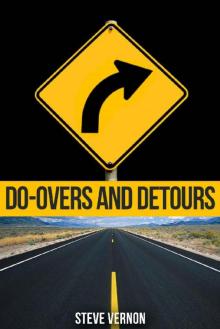 Do-Overs and Detours - Eighteen Eerie Tales (Stories to SERIOUSLY Creep You Out Book 4)
Do-Overs and Detours - Eighteen Eerie Tales (Stories to SERIOUSLY Creep You Out Book 4)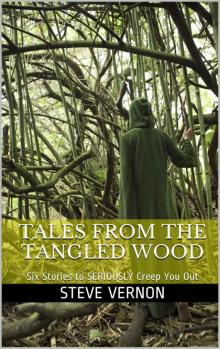 Tales From The Tangled Wood: Six Stories to SERIOUSLY Creep You Out
Tales From The Tangled Wood: Six Stories to SERIOUSLY Creep You Out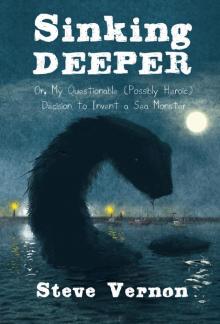 Sinking Deeper
Sinking Deeper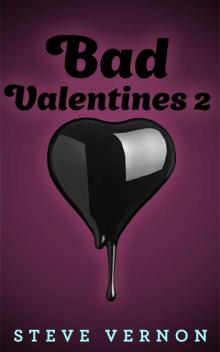 Bad Valentines 2: Six Twisted Love Stories (Stories to SERIOUSLY Creep You Out Book 5)
Bad Valentines 2: Six Twisted Love Stories (Stories to SERIOUSLY Creep You Out Book 5)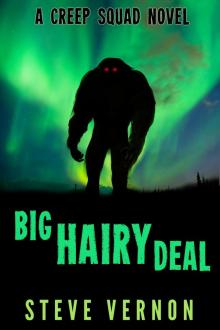 Big Hairy Deal
Big Hairy Deal Maritime Murder
Maritime Murder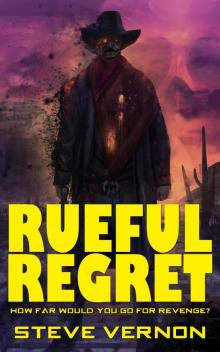 Rueful Regret
Rueful Regret